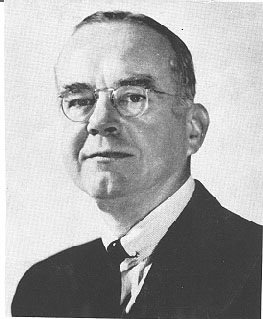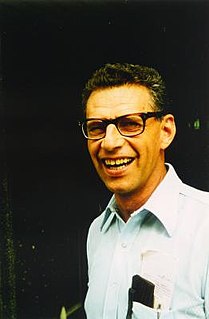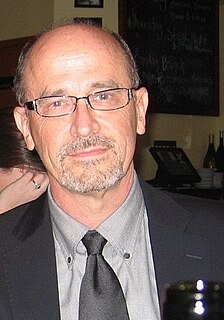
Gregory Benford is an American science fiction author and astrophysicist who is Professor Emeritus at the Department of Physics and Astronomy at the University of California, Irvine. He is a contributing editor of Reason magazine.

Jared Mason Diamond is an American geographer, historian, ornithologist, and author best known for his popular science books The Third Chimpanzee (1991); Guns, Germs, and Steel ; Collapse (2005), The World Until Yesterday (2012), and Upheaval (2019). Originally trained in biochemistry and physiology, Diamond is known for drawing from a variety of fields, including anthropology, ecology, geography, and evolutionary biology. He is a professor of geography at UCLA.

The Phi Beta Kappa Society (ΦΒΚ) is the oldest academic honor society in the United States, and the most prestigious, due in part to its long history and academic selectivity. Phi Beta Kappa aims to promote and advocate excellence in the liberal arts and sciences, and to induct the most outstanding students of arts and sciences at only select American colleges and universities. It was founded at the College of William and Mary on December 5, 1776, as the first collegiate Greek-letter fraternity and was among the earliest collegiate fraternal societies. Since its inception, 17 U.S. Presidents, 40 U.S. Supreme Court Justices, and 136 Nobel Laureates have been inducted members.

James Burnham was an American philosopher and political theorist. He chaired the philosophy department at New York University; His first book was An Introduction to Philosophical Analysis (1931). Burnham became a prominent Trotskyist activist in the 1930s. He rejected Marxism and became an even more influential theorist of the right as a leader of the American conservative movement. His book The Managerial Revolution, published in 1941, speculated on the future of capitalism. Burnham was an editor and a regular contributor to William F. Buckley's conservative magazine National Review on a variety of topics. He rejected containment of the Soviet Union and called for the rollback of communism worldwide.

Robert Woodrow Wilson is an American astronomer who, along with Arno Allan Penzias, discovered cosmic microwave background radiation (CMB) in 1964. The pair won the 1978 Nobel prize in physics for their discovery.

George Armitage Miller was an American psychologist who was one of the founders of cognitive psychology, and more broadly, of cognitive science. He also contributed to the birth of psycholinguistics. Miller wrote several books and directed the development of WordNet, an online word-linkage database usable by computer programs. He authored the paper, "The Magical Number Seven, Plus or Minus Two," in which he observed that many different experimental findings considered together reveal the presence of an average limit of seven for human short-term memory capacity. This paper is frequently cited by psychologists and in the wider culture. Miller won numerous awards, including the National Medal of Science.

Edward Mills Purcell was an American physicist who shared the 1952 Nobel Prize for Physics for his independent discovery of nuclear magnetic resonance in liquids and in solids. Nuclear magnetic resonance (NMR) has become widely used to study the molecular structure of pure materials and the composition of mixtures. Friends and colleagues knew him as Ed Purcell.

Branko Grünbaum was a Croatian-born mathematician of Jewish descent and a professor emeritus at the University of Washington in Seattle. He received his Ph.D. in 1957 from Hebrew University of Jerusalem in Israel.

Critical geography is theoretically informed geographical scholarship that promotes social justice, liberation, and leftist politics. Critical geography is also used as an umbrella term for Marxist, feminist, postmodern, poststructural, queer, left-wing, and activist geography.

The Making of the Atomic Bomb is a contemporary history book written by the American journalist and historian Richard Rhodes, first published by Simon & Schuster in 1987. It won the Pulitzer Prize for General Non-Fiction, the National Book Award for Nonfiction, and a National Book Critics Circle Award. The narrative covers people and events from early 20th century discoveries leading to the science of nuclear fission, through the Manhattan Project and the atomic bombings of Hiroshima and Nagasaki.

Chaos: Making a New Science is a debut non-fiction book by James Gleick that initially introduced the principles and early development of the chaos theory to the public. It was a finalist for the National Book Award and the Pulitzer Prize in 1987, and was shortlisted for the Science Book Prize in 1989. The book was published on October 29, 1987 by Viking Books.

Andrew Herbert Knoll is the Fisher Research Professor of Natural History and a Research Professor of Earth and Planetary Sciences at Harvard University. Born in West Reading, Pennsylvania in 1951, Andrew Knoll graduated from Lehigh University with a Bachelor of Arts in 1973 and received his Ph.D. from Harvard University in 1977 for a dissertation entitled "Studies in Archean and Early Proterozoic Paleontology." Knoll taught at Oberlin College for five years before returning to Harvard as a professor in 1982. At Harvard, he serves in the departments of Organismic and Evolutionary Biology and Earth and Planetary Sciences.
Clarence Roderic Allen was a geologist who studied seismology.
Robert George Bergman is an American chemist. He is Professor of the Graduate School and Gerald E. K. Branch Distinguished Professor Emeritus at the University of California, Berkeley.

Nicholas B. Suntzeff is an American University Distinguished Professor and holds the Mitchell/Heep/Munnerlyn Chair of Observational Astronomy in the Department of Physics & Astronomy at Texas A&M University where he is Director of the Astronomy Program. He is an observational astronomer specializing in cosmology, supernovae, stellar populations, and astronomical instrumentation. With Brian Schmidt he founded the High-z Supernova Search Team, which was honored with the Nobel Prize in Physics in 2011 to Schmidt and Adam Riess.
Richard James Duffin was an American physicist, known for his contributions to electrical transmission theory and to the development of geometric programming and other areas within operations research.
George Mandler was an Austrian-born American psychologist, who became a distinguished professor of psychology at the University of California, San Diego.
James Davison Hunter is an American sociologist and originator of the term "Culture Wars" in his 1991 book Culture Wars: The Struggle to Define America. Hunter is the LaBrosse-Levinson Distinguished Professor of Religion, Culture, and Social Theory at the University of Virginia and the founder and executive director of the university's Institute for Advanced Studies in Culture. He is also a senior fellow at the Trinity Forum.
James Ralph Beniger was an American historian and sociologist and Professor of Communications and Sociology at the Annenberg School for Communication at the University of Southern California, particularly known for his early work on the history of quantitative graphics in statistics, and his later work on the technological and economic origins of the information society.

Vaidyeswaran Rajaraman is an Indian engineer, academic and writer, known for his pioneering efforts in the field of Computer Science Education in India. He is credited with the establishment of the first academic program in computer science in India, which he helped initiate at the Indian Institute of Technology, Kanpur in 1965. An elected fellow of all the Indian science academies, he is a recipient of Shanti Swarup Bhatnagar Prize, the highest Indian award in Science and Technology category for young scientists and several other honors including Om Prakash Bhasin Award and Homi Bhabha Prize. The Government of India awarded him the third highest civilian honor of the Padma Bhushan, in 1998, for his contributions to science.














